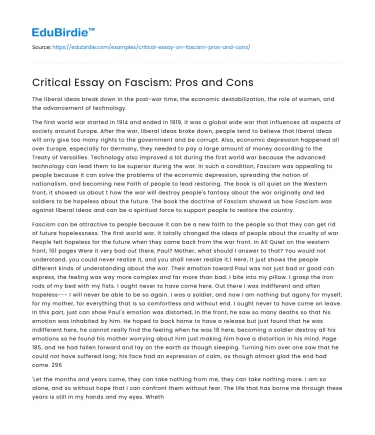Introduction
Fascism, a term often associated with authoritarian regimes, militarism, and nationalism, has been a subject of intense debate since its prominence in the early 20th century. Originating in Italy under Benito Mussolini and later adopted by Adolf Hitler's Nazi regime, fascism presents a model of governance that prioritizes the state over the individual, often leading to the suppression of dissent and a unified national identity. While widely criticized for its oppressive nature, some argue that fascism can bring stability and unity in times of crisis. This essay aims to critically analyze the potential merits and demerits of fascism, drawing on historical examples and theoretical perspectives. By examining both the pros and cons, this essay seeks to provide a balanced view, acknowledging the complexities of fascism as a political ideology.
Pros of Fascism: Unity and Stability
One of the primary arguments in favor of fascism is its potential to create a unified and stable society. In times of political or economic turmoil, the centralized power structure of a fascist regime can provide decisive leadership and a clear sense of direction. As Mussolini famously declared, "Fascism is not a philosophy but a political technique." The emphasis on national unity and collective identity can foster a strong sense of purpose among the populace and reduce internal conflicts. Historically, fascism has been credited with revitalizing the Italian economy during the interwar period through extensive public works programs and industrial development.
Save your time!
We can take care of your essay
- Proper editing and formatting
- Free revision, title page, and bibliography
- Flexible prices and money-back guarantee
Moreover, fascism's focus on militarism and discipline can enhance national security, deterring external threats and fostering a robust defense mechanism. The Nazi regime, for example, is often cited for its rapid military modernization and strategic prowess, which initially positioned Germany as a formidable power in Europe. This aspect of fascism can be appealing in volatile regions where external threats are imminent, and a strong military presence is deemed necessary. However, while these supposed benefits of fascism might appear attractive in certain contexts, they often come at the cost of personal freedoms and ethical governance, raising significant concerns that will be explored further.
Cons of Fascism: Oppression and Human Rights Violations
Despite its potential for fostering unity and stability, fascism is predominantly criticized for its authoritarian nature and the suppression of fundamental human rights. The centralization of power in a single leader or party often leads to the erosion of democratic institutions and the elimination of political pluralism. Under fascist regimes, dissent is typically met with severe repercussions, including imprisonment, torture, or execution. The infamous Gestapo in Nazi Germany epitomizes the brutal enforcement of fascist policies, as it systematically eliminated opposition to Hitler's regime.
Furthermore, fascism's emphasis on national superiority and ethnocentrism has historically led to egregious human rights abuses, including genocide and ethnic cleansing. The Holocaust remains one of the most harrowing examples of the destructive potential of fascist ideologies. This aspect of fascism not only violates international human rights norms but also sows division and hatred within and between nations. The oppressive nature of fascist regimes often results in long-lasting societal trauma and a legacy of mistrust and animosity. These significant drawbacks underscore the ethical dilemmas and potential dangers inherent in fascist governance, challenging any perceived benefits.
Counter-Arguments and Rebuttal
Proponents of fascism might argue that the discipline and order it enforces can lead to economic growth and societal progress. However, such arguments often overlook the unsustainable nature of fascist policies and their detrimental effects on human rights and global relations. While a fascist regime might achieve short-term gains through aggressive industrialization and military expansion, these developments are frequently accompanied by widespread human suffering and environmental degradation.
Moreover, the perceived efficiency of fascist governance is often a result of the stifling of dissent and the manipulation of information, rather than genuine societal advancement. As the philosopher Hannah Arendt noted, "The ideal subject of totalitarian rule is not the convinced Nazi but people for whom the distinction between fact and fiction, true and false, no longer exists." This observation highlights the inherent dangers of fascism's manipulation of truth and the corrosive impact it has on society's moral and ethical fabric. Ultimately, the cons of fascism, particularly its human rights violations and suppression of freedoms, outweigh any potential benefits it might offer, making it an untenable model for governance in the modern world.
Conclusion
In conclusion, while fascism may offer certain perceived benefits such as unity and stability in times of crisis, these are overshadowed by its profound drawbacks. The authoritarian nature of fascist regimes inevitably leads to the erosion of democratic values, suppression of individual freedoms, and severe human rights violations. Historical examples, such as Nazi Germany and Fascist Italy, serve as stark reminders of the destructive potential of fascist ideologies. As such, it is crucial to critically engage with and challenge any resurgence of fascist sentiments in contemporary politics, advocating instead for inclusive and democratic governance that upholds the dignity and rights of all individuals. By recognizing the dangers of fascism, societies can work towards building more equitable and just systems that promote peace and prosperity for all.






 Stuck on your essay?
Stuck on your essay?

